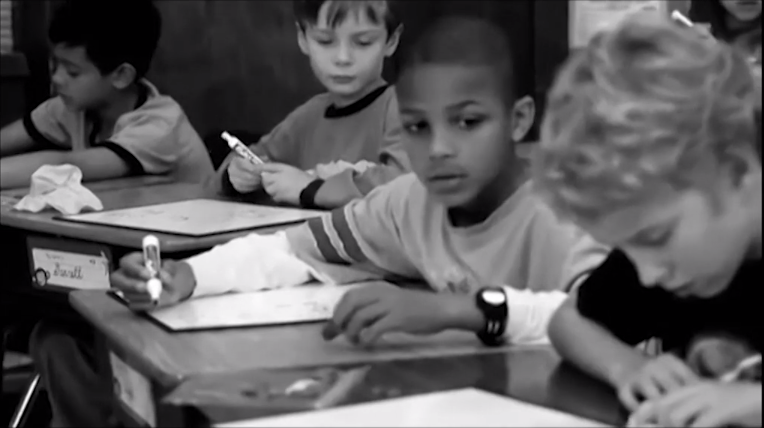 Set in Wake County, N.C., "Mission Critical" is a 25-minute documentary that follows the stories of three students and how a school system pushed them into juvenile and criminal courts.
Set in Wake County, N.C., "Mission Critical" is a 25-minute documentary that follows the stories of three students and how a school system pushed them into juvenile and criminal courts.
“Even though we have a voice, nobody heard it. Nobody heard it for a long time,” a parent says at the opening of the film.
The documentary was produced by Advocates for Children’s Services, a project of Legal Aid of North Carolina. The lawyers and staff of the organization bought a $200 camera and over 18 months shot raw interviews of parents and students who’ve been affected by the pipeline. After piecing it together, “Mission Critical: Ending the School-to-Prison Pipeline in Wake County” was released last week at a community screening.
“We really wanted to humanize and personalize what really is a civil rights crisis in our community,” said Jason Langberg, supervising attorney at the Advocates for Children’s Services and one of the film’s directors.
Wake County Public Schools has one the biggest school-to-prison pipelines in the nation, Langberg said. During the 2011-2012 school year, the district gave out 14,223 short-term suspensions and 403 long-term suspensions. The figure amounts to one suspension given for every 10 students, according to a report by Advocates for Children’s Services.
Suspensions also disproportionately affect students of color and students with disabilities.
“African-American students are six times more likely than white students to be suspended for the same offenses,” Langberg said.
North Carolina is one of two states to treat 16- and 17-year-olds as adults when charged with criminal offenses, which can lead to life-long consequences, he said.
“This issue is very real and very destructive for families,” Langberg said.
Watch the documentary below:
Mission Critical: Ending the School-to-Prison-Pipeline in Wake County from ACS on Vimeo.
Well, as a juvenile court counselor in NC, I would have appreciated input from school officials, the other side if you will, in order to make this a real documentary rather than a promotional piece for advocacy organizations. In my experience, most juvenile advocacy groups in NC focus on limited aspects of a complex issue rather than all of the factors necessary to truly reform what needs to be reformed, similar to single-focus political lobbies. Other factors negatively affecting student behavior and not mentioned by these groups are dysfunctional family units, unresolved trauma issues (as reported by some of the families in this film), lack of positive male role models (as reported by one guardian in this film), community chaos and negative culture (don’t get me started on the entertainment industry), funding gaps to the school for services advocated by this film, etc. etc. School systems have little if any control over these issues and without the resolution of ALL issues affecting students, huge imperfections in reform efforts will remain.
Regarding the issue of police in schools, the schools have faced massive pressure from the public to keep the school environment safe because of all of the school shootings in the past couple of decades. Bullying in schools has increased as a major concern as well. The onus on principals to make their schools absolutely safe has pressured them to make imperfect choices with very limited tools in the toolbox.
Here are some additional thoughts: Since when have the schools become responsible for the mental health treatment of students? For decades schools have been given the responsibility for acculturating children while family and community input waned. What happens when parents don’t support school efforts (I can tell you with unequivocal honesty that parents of problematic children frequently either do not support their children in school or undermine school efforts)? Am I to take as gospel truth what the parents/custodians and children in the film report? What, if any, negative school behaviors were being manifested prior to the suspensions? (NOTE: the school system would not be allowed to speak about specific instances due to confidentiality laws).
With all that said, clearly improvements and reform in the school and juvenile justice systems are necessary in order to improve the education and positive growth of our children. They are necessary and can be attempted without the resolution of the aforementioned other complicating factors (although with reduced results than if all of the other factors were properly addressed as well). Restorative justice, as presented in the film, is a great method (when properly implemented) for improving the way we respond to negative behavior. Other proven strategies are out there as well.
Are we as a society willing to pay for these improvements? That is another unspoken factor but always crucial in supporting effective reforms. I am willing to bet that the vast proportion of school and juvenile justice systems and personnel are willing to follow reforms as long as those reforms are properly funded for success.
Anybody can “advocate”, even every one of the eight blind men holding a different part of an elephant while describing the elephant. If advocacy groups do not address the totality of the circumstances and do not address the proper resourcing of the actions they promote, they will be doing a disservice to our children and to the legitimate attempts of those of us in the trenches trying to help our State’s children.